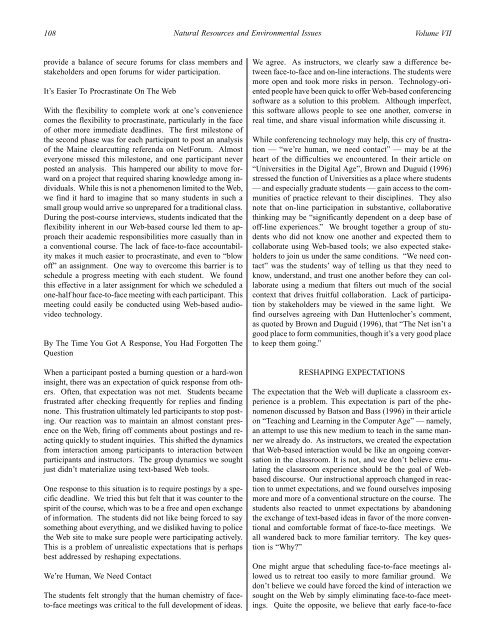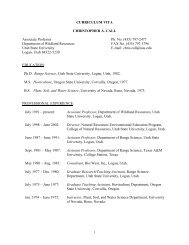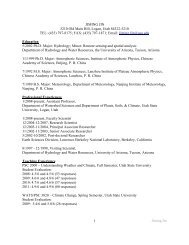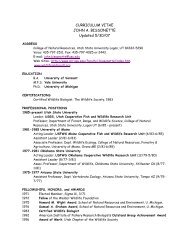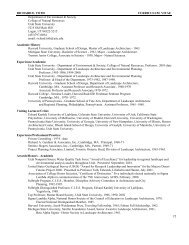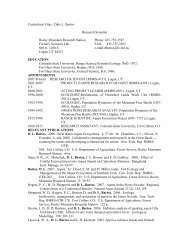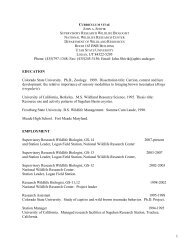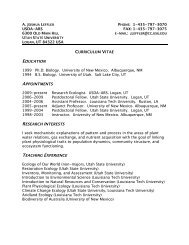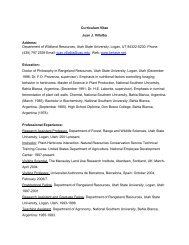University Education in Natural Resources - CNR Home - Utah State ...
University Education in Natural Resources - CNR Home - Utah State ...
University Education in Natural Resources - CNR Home - Utah State ...
Create successful ePaper yourself
Turn your PDF publications into a flip-book with our unique Google optimized e-Paper software.
108 <strong>Natural</strong> <strong>Resources</strong> and Environmental Issues Volume VII<br />
provide a balance of secure forums for class members and<br />
stakeholders and open forums for wider participation.<br />
It’s Easier To Procrast<strong>in</strong>ate On The Web<br />
With the flexibility to complete work at one’s convenience<br />
comes the flexibility to procrast<strong>in</strong>ate, particularly <strong>in</strong> the face<br />
of other more immediate deadl<strong>in</strong>es. The first milestone of<br />
the second phase was for each participant to post an analysis<br />
of the Ma<strong>in</strong>e clearcutt<strong>in</strong>g referenda on NetForum. Almost<br />
everyone missed this milestone, and one participant never<br />
posted an analysis. This hampered our ability to move forward<br />
on a project that required shar<strong>in</strong>g knowledge among <strong>in</strong>dividuals.<br />
While this is not a phenomenon limited to the Web,<br />
we f<strong>in</strong>d it hard to imag<strong>in</strong>e that so many students <strong>in</strong> such a<br />
small group would arrive so unprepared for a traditional class.<br />
Dur<strong>in</strong>g the post-course <strong>in</strong>terviews, students <strong>in</strong>dicated that the<br />
flexibility <strong>in</strong>herent <strong>in</strong> our Web-based course led them to approach<br />
their academic responsibilities more casually than <strong>in</strong><br />
a conventional course. The lack of face-to-face accountability<br />
makes it much easier to procrast<strong>in</strong>ate, and even to “blow<br />
off” an assignment. One way to overcome this barrier is to<br />
schedule a progress meet<strong>in</strong>g with each student. We found<br />
this effective <strong>in</strong> a later assignment for which we scheduled a<br />
one-half hour face-to-face meet<strong>in</strong>g with each participant. This<br />
meet<strong>in</strong>g could easily be conducted us<strong>in</strong>g Web-based audiovideo<br />
technology.<br />
By The Time You Got A Response, You Had Forgotten The<br />
Question<br />
When a participant posted a burn<strong>in</strong>g question or a hard-won<br />
<strong>in</strong>sight, there was an expectation of quick response from others.<br />
Often, that expectation was not met. Students became<br />
frustrated after check<strong>in</strong>g frequently for replies and f<strong>in</strong>d<strong>in</strong>g<br />
none. This frustration ultimately led participants to stop post<strong>in</strong>g.<br />
Our reaction was to ma<strong>in</strong>ta<strong>in</strong> an almost constant presence<br />
on the Web, fir<strong>in</strong>g off comments about post<strong>in</strong>gs and react<strong>in</strong>g<br />
quickly to student <strong>in</strong>quiries. This shifted the dynamics<br />
from <strong>in</strong>teraction among participants to <strong>in</strong>teraction between<br />
participants and <strong>in</strong>structors. The group dynamics we sought<br />
just didn’t materialize us<strong>in</strong>g text-based Web tools.<br />
One response to this situation is to require post<strong>in</strong>gs by a specific<br />
deadl<strong>in</strong>e. We tried this but felt that it was counter to the<br />
spirit of the course, which was to be a free and open exchange<br />
of <strong>in</strong>formation. The students did not like be<strong>in</strong>g forced to say<br />
someth<strong>in</strong>g about everyth<strong>in</strong>g, and we disliked hav<strong>in</strong>g to police<br />
the Web site to make sure people were participat<strong>in</strong>g actively.<br />
This is a problem of unrealistic expectations that is perhaps<br />
best addressed by reshap<strong>in</strong>g expectations.<br />
We’re Human, We Need Contact<br />
The students felt strongly that the human chemistry of faceto-face<br />
meet<strong>in</strong>gs was critical to the full development of ideas.<br />
We agree. As <strong>in</strong>structors, we clearly saw a difference between<br />
face-to-face and on-l<strong>in</strong>e <strong>in</strong>teractions. The students were<br />
more open and took more risks <strong>in</strong> person. Technology-oriented<br />
people have been quick to offer Web-based conferenc<strong>in</strong>g<br />
software as a solution to this problem. Although imperfect,<br />
this software allows people to see one another, converse <strong>in</strong><br />
real time, and share visual <strong>in</strong>formation while discuss<strong>in</strong>g it.<br />
While conferenc<strong>in</strong>g technology may help, this cry of frustration<br />
— “we’re human, we need contact” — may be at the<br />
heart of the difficulties we encountered. In their article on<br />
“Universities <strong>in</strong> the Digital Age”, Brown and Duguid (1996)<br />
stressed the function of Universities as a place where students<br />
— and especially graduate students — ga<strong>in</strong> access to the communities<br />
of practice relevant to their discipl<strong>in</strong>es. They also<br />
note that on-l<strong>in</strong>e participation <strong>in</strong> substantive, collaborative<br />
th<strong>in</strong>k<strong>in</strong>g may be “significantly dependent on a deep base of<br />
off-l<strong>in</strong>e experiences.” We brought together a group of students<br />
who did not know one another and expected them to<br />
collaborate us<strong>in</strong>g Web-based tools; we also expected stakeholders<br />
to jo<strong>in</strong> us under the same conditions. “We need contact”<br />
was the students’ way of tell<strong>in</strong>g us that they need to<br />
know, understand, and trust one another before they can collaborate<br />
us<strong>in</strong>g a medium that filters out much of the social<br />
context that drives fruitful collaboration. Lack of participation<br />
by stakeholders may be viewed <strong>in</strong> the same light. We<br />
f<strong>in</strong>d ourselves agree<strong>in</strong>g with Dan Huttenlocher’s comment,<br />
as quoted by Brown and Duguid (1996), that “The Net isn’t a<br />
good place to form communities, though it’s a very good place<br />
to keep them go<strong>in</strong>g.”<br />
RESHAPING EXPECTATIONS<br />
The expectation that the Web will duplicate a classroom experience<br />
is a problem. This expectation is part of the phenomenon<br />
discussed by Batson and Bass (1996) <strong>in</strong> their article<br />
on “Teach<strong>in</strong>g and Learn<strong>in</strong>g <strong>in</strong> the Computer Age” — namely,<br />
an attempt to use this new medium to teach <strong>in</strong> the same manner<br />
we already do. As <strong>in</strong>structors, we created the expectation<br />
that Web-based <strong>in</strong>teraction would be like an ongo<strong>in</strong>g conversation<br />
<strong>in</strong> the classroom. It is not, and we don’t believe emulat<strong>in</strong>g<br />
the classroom experience should be the goal of Webbased<br />
discourse. Our <strong>in</strong>structional approach changed <strong>in</strong> reaction<br />
to unmet expectations, and we found ourselves impos<strong>in</strong>g<br />
more and more of a conventional structure on the course. The<br />
students also reacted to unmet expectations by abandon<strong>in</strong>g<br />
the exchange of text-based ideas <strong>in</strong> favor of the more conventional<br />
and comfortable format of face-to-face meet<strong>in</strong>gs. We<br />
all wandered back to more familiar territory. The key question<br />
is “Why?”<br />
One might argue that schedul<strong>in</strong>g face-to-face meet<strong>in</strong>gs allowed<br />
us to retreat too easily to more familiar ground. We<br />
don’t believe we could have forced the k<strong>in</strong>d of <strong>in</strong>teraction we<br />
sought on the Web by simply elim<strong>in</strong>at<strong>in</strong>g face-to-face meet<strong>in</strong>gs.<br />
Quite the opposite, we believe that early face-to-face


